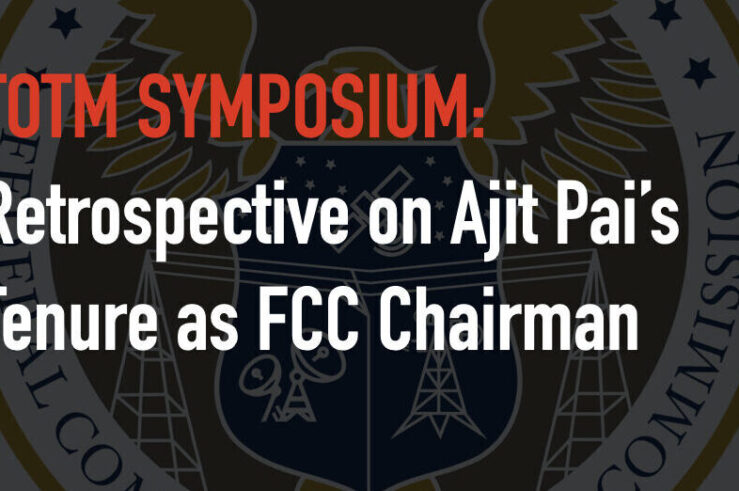Showing results for: “sirius xm merger”
Bad Blood at the FTC
John Carreyrou’s marvelous book Bad Blood chronicles the rise and fall of Theranos, the one-time Silicon Valley darling that was revealed to be a house of cards.[1] Theranos’s Svengali-like founder, Elizabeth Holmes, convinced scores of savvy business people (mainly older men) that her company was developing a machine that could detect all manner of maladies from ... Bad Blood at the FTC
The Globalization of Antitrust: A Cost-Benefit Appraisal
Overview Virtually all countries in the world have adopted competition laws over the last three decades. In a recent Mercatus Foundation Research Paper, I argue that the spread of these laws has benefits and risks. The abstract of my Paper states: The United States stood virtually alone when it enacted its first antitrust statute in ... The Globalization of Antitrust: A Cost-Benefit Appraisal
Antitrust Lessons from AT&T’s M&A Fiasco
The chorus of condemnation continued with vigor even after the DOJ’s loss in court and AT&T’s consummation of the transaction. With AT&T’s May 17 announcement that it will unwind the two-year-old acquisition and therefore abandon its strategy to integrate content and distribution, it is clear these predictions of impending market dominance were unfounded. This widely ... Antitrust Lessons from AT&T’s M&A Fiasco
Four Reasons to Reject Neo-Brandeisian Critiques of the Consumer Welfare Approach to Antitrust
In the battle of ideas, it is quite useful to be able to brandish clear and concise debating points in support of a proposition, backed by solid analysis. Toward that end, in a recent primer about antitrust law published by the Mercatus Center, I advance four reasons to reject neo-Brandeisian critiques of the consensus (at ... Four Reasons to Reject Neo-Brandeisian Critiques of the Consumer Welfare Approach to Antitrust
How Antitrust Regulators Could Use the ‘Perpetual Inventory Method’ to Value R&D
The slew of recent antitrust cases in the digital, tech, and pharmaceutical industries has brought significant attention to the investments many firms in these industries make in “intangibles,” such as software and research and development (R&D). Intangibles are recognized to have an important effect on a company’s (and the economy’s) performance. For example, Jonathan Haskel ... How Antitrust Regulators Could Use the ‘Perpetual Inventory Method’ to Value R&D
How FTC v. Qualcomm Led to the Nvidia-Arm Acquisition
In a constructive development, the Federal Trade Commission has joined its British counterpart in investigating Nvidia’s proposed $40 billion acquisition of chip designer Arm, a subsidiary of Softbank. Arm provides the technological blueprints for wireless communications devices and, subject to a royalty fee, makes those crown-jewel assets available to all interested firms. Notwithstanding Nvidia’s stated ... How FTC v. Qualcomm Led to the Nvidia-Arm Acquisition
Ajit Pai Brought the FCC’s Media Ownership Rules into the Modern Age
I’m delighted to add my comments to the chorus of voices honoring Ajit Pai’s remarkable tenure at the Federal Communications Commission. I’ve known Ajit longer than most. We were classmates in law school … let’s just say “many” years ago. Among the other symposium contributors I know of only one—fellow classmate, Tom Nachbar—who can make ... Ajit Pai Brought the FCC’s Media Ownership Rules into the Modern Age
How Chairman Pai Restored the FCC’s Independence
Chairman Ajit Pai will be remembered as one of the most consequential Federal Communications Commission chairmen in history. His policy accomplishments are numerous, including the repeal of Title II regulation of the internet, rural broadband development, increased spectrum for 5G, decreasing waste in universal service funding, and better controlling robocalls. Less will be said about ... How Chairman Pai Restored the FCC’s Independence
The DOJ’s Antitrust Case Against Google: A Tough Slog, but Maybe an Intriguing Possibility?
The U.S. Department of Justice’s (DOJ) antitrust case against Google, which was filed in October 2020, will be a tough slog.[1] It is an alleged monopolization (Sherman Act, Sec. 2) case; and monopolization cases are always a tough slog. In this brief essay I will lay out some of the issues in the case and raise ... The DOJ’s Antitrust Case Against Google: A Tough Slog, but Maybe an Intriguing Possibility?
The Case Against Google Advertising: What’s the Relevant Market and How Many Are There?
U.S. antitrust regulators have a history of narrowly defining relevant markets—often to the point of absurdity—in order to create market power out of thin air. The Federal Trade Commission (FTC) famously declared that Whole Foods and Wild Oats operated in the “premium natural and organic supermarkets market”—a narrowly defined market designed to exclude other supermarkets ... The Case Against Google Advertising: What’s the Relevant Market and How Many Are There?
Facebook and the Pros and Cons of Ex Post Merger Reviews
The Federal Trade Commission and 46 state attorneys general (along with the District of Columbia and the Territory of Guam) filed their long-awaited complaints against Facebook Dec. 9. The crux of the arguments in both lawsuits is that Facebook pursued a series of acquisitions over the past decade that aimed to cement its prominent position ... Facebook and the Pros and Cons of Ex Post Merger Reviews
The Limits of Rivalry
I am left wondering, however, if he’s misdiagnosed the problem – or at least whether the cure he offers would be seen as sufficient by those most vocally asserting that antitrust is failing. And, of course, I recognize that his objective in writing this book is not to bring harmony to a deeply divided debate, ... The Limits of Rivalry










